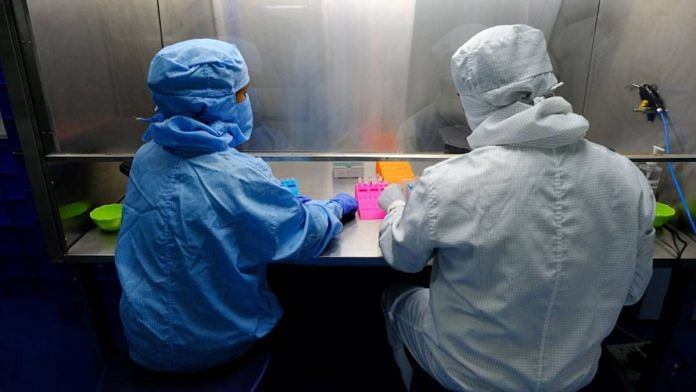New Delhi: As Delhi reels under the second Covid wave, some laboratories in the city have reported shortage of raw materials for ‘inflammatory markers’ tests, which are used by doctors to check the criticality of infection and the spread of the disease in Covid patients.
The shortage, according to the laboratories, is due to the increased demand for these blood tests in the past two weeks.
As of 24 April, Delhi has recorded a total of 10,00,4782 cases with 13,898 deaths and 8,97,804 recoveries. The positivity rate in the city stood at 32.43 per cent on 23 April.
Bigger laboratories in the city said the shortage in supply of raw materials has hit smaller operators more since they themselves are getting supplies from various sources.
Meanwhile, while some doctors said the absence of inflamatory markers test — owing to the shortage in raw materials — is likely to affect treatments, by making it difficult for doctors to decided on the course of action for patients, some among the fraternity felt that these tests are being over used now and are not essential for treating every patient.
Also read: As Modi govt faces up to Covid disaster, BJP learns a tough truth — the virus doesn’t vote
What are inflammatory marker tests?
Doctors advise for inflammatory marker tests, such as D-Dimer and IL6 (interleukin-6), to assess the inflammation in a patient’s body, which allows them to decide the future course of treatment including what drugs are to be used, if a CT scan is needed or if hospitalisation is required.
According to a study by the International Journal for Infectious Diseases in April 2020, measurement of inflammatory markers assists clinicians to monitor and evaluate the severity and prognosis of Covid.
“These tests are essentially to check likelihood of blood clotting [from the infection] and to monitor the extent of inflammation in the body and the likelihood of serious problems arising out of the infection itself. They are prognostic markers to some extent,” said Dr K. Srinath Reddy, president, Public Health Foundation of India.
Also read: Pune paradox: Why vaccine & virus research hub is among worst-affected by Covid
Increased demand reason for shortage of test kits
Several private labs, including major national laboratories, are facing a shortage of raw materials such as enzymes and reagents, required for these tests, owing to the spike in cases in Delhi and the higher demand for these tests.
“Over the past few days we have been facing a lot of distress with procuring reagents for these tests. There are only select vendors [who supply these] and they are not giving us any idea of when these reagents will be available,” said Dr Arjun Dang, CEO, Dr Dang’s Lab.
Laboratories said even orders that were placed a month back are not being delivered owing to increased demand.
“There has been short supply owing to increased demand in the past two weeks. If you have placed an order of 10,000 for instance, vendors are able to send only 1,000,” said Dr Ravi Tomar, director, CRL Diagnostics Private Limited. “Vendors also have their own limitations as nobody expected such a surge in cases. We are hoping new kits will come by next week,” he added.
Big laboratories with centres across India, such as Metropolis and SRL Laboratory, however, said though there is a shortage, it has hit smaller players harder. “There is a shortage of materials, but we planned and are managing to build our capacity [and stock of supplies] for these tests. Smaller labs that weren’t able to do this are suffering more,” said Ameera Shah, MD, Metropolis Healthcare limited.
These labs also said they are managing to minimise the impact of the shortage by procuring supplies from multiple sources. “Since we have multiple platforms for the same test, we have been able to manage gaps in supply from certain vendors,” said a top official at SRL Limited.
Also read: A bacteria made Indians political. A virus will now extract a political price from Modi
Tests crucial to Covid treatment
Doctors said the absence of these tests will affect their ability to decide on course of treatment for patients.
“For instance, the IL6 test reveals whether there could be, or is, a cytokine storm in the body [which can cause multiple organ failure]. The Ddimer test shows blood clotting. If IL6 test is elevated [if there are inflammations in different organs of the body] then doctors start the patient on steroids, or if a patient is at high risk, they prescribe drugs like remdesivir, based on the results of the inflammatory markers tests. The tests also help decide the need for hospitalisations and are crucial for timely management of Covid,” said Dr Dang.
Dr Purabi Barman, principal consultant & head of microbiology department, BLK Super Speciality Hospital, agreed: “IL6 level is a good prognostic marker and gives the inflammatory response of the body. Cytokine therapy is given accordingly. But since we have a shortage now we are making do with the other tests like Ddimer.”
Despite the usefulness of these tests, however, experts also offered caution against their overuse.
“These tests don’t help everybody and are being overused now. What is important is to note the setting of the use of these tests. Essentially, these tests are to see inflammatory reactions to predict the course of hospitalised patients. They can be used for those being treated at home, but are not really required, since at that stage what is really needed is monitoring the patient’s oxygen levels,” said Dr Reddy.
He added: “If someone is at home and stable and not breathless and able to move around, they don’t need these tests. These are only for hospitalised care under intensive care. These tests are often being prescribed unnecessarily.”
(Edited by Poulomi Banerjee)
Also read: ‘No mother should see such day’: Stories of despair in CM Yogi’s Gorakhpur as UP fights Covid



